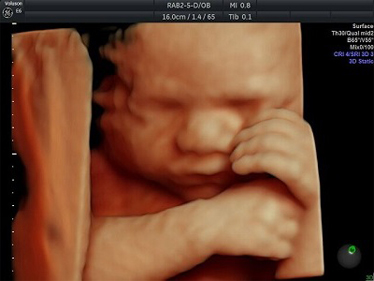If you've had a look at our
Images & Videos section, you may be wondering if the examples on that page really are representative of the quality and the clarity you'll see on the screen when you come in for a 4D scan of your own. Will we be able to depict your unborn baby with that same level of detail?

The short answer is yes, for the vast majority of scans we perform. However, 4D ultrasound scans are not an exact science, and with each and every pregnancy being so very different, the achievable results can vary for each client, thus making it very difficult to provide an airtight guarantee when it comes to the quality of the imagery we aim to capture during our 3D/4D scans. That said, we will always endeavour to obtain the very best result achievable, working with you to encourage your baby into the best possible position; however, whilst a change of position can, in most cases, be achieved with the aid of sugar stimulation, there are other factors that may affect image quality and resolution.
All ultrasound scans obtain images via the reflection of sound waves, which penetrate from the probe placed on your belly through to your baby and back again. The image then displayed is the result of this reflection. Whilst we at First Encounters Ultrasound use the latest, most advanced ultrasound technology (effectively enabling an element of image manipulation), image quality and resolution can unfortunately be impaired if the sound waves have more distance to travel, thus creating a weaker reflection and a lower-resolution image.
In some cases, a high BMI can lead to a less than perfect result; however, our own experience has also identified that, in cases of a high BMI, clearer images can be achieved when the scan is performed slightly later (between 29 and 30 weeks gestation). This is because the baby sometimes moves closer to the stomach wall, thus creating a shorter distance for the reflected sound waves to cover, resulting in a better image resolution.
The key points to remember when planning your 4D experience are as follows:
- Your baby will require room for movement.
- Your baby will need to be surrounded by plenty of fluid to assist the projection of imagery
In order to achieve the best possible results, we always recommend between 25 and 29 weeks as the optimum time for a 3D/4D scan. However, in the event that your baby is uncooperative on the day, a complimentary rescan will be offered on an alternative day (where appropriate, and subject to terms and conditions).
All of this being said, we'd like to say once again that unsatisfactory scans are very few and far between. The vast majority of women who come to us leave absolutely thrilled with the results of their 4D scan - if you'd like to book a scan of your own, please
click here to compare the packages we offer. Alternatively, if you have any other questions to ask, feel free to give us a call on
02920 732671.
